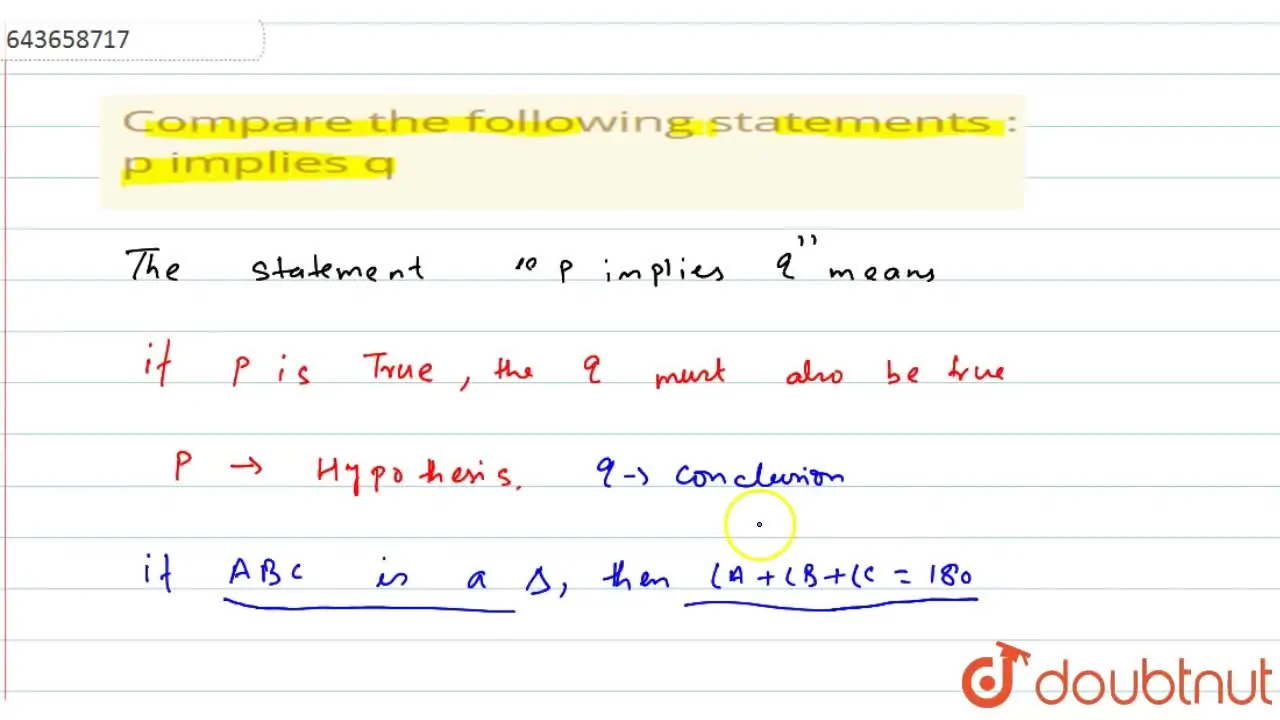Compare the following statements :
p implies q
The correct Answer is:All five statements are equivalents, i.e.,all are different ways of saying. "If p, then q."
Step by step video, text & image solution for Compare the following statements : p implies q by Maths experts to help you in doubts & scoring excellent marks in Class 11 exams.
Related Playlists
- BOOK - ICSECHAPTER - MATHEMATICAL REASONINGEXERCISE - EXERCISE 27 (G)7videos
MATHEMATICAL REASONING
- BOOK - ICSECHAPTER - MATHEMATICAL REASONINGEXERCISE - CHAPTER TEST10videos
MATHEMATICAL REASONING
- BOOK - ICSECHAPTER - MATHEMATICAL REASONINGEXERCISE - EXERCISE 27 (E)29videos
MATHEMATICAL REASONING
- BOOK - ICSECHAPTER - MATHEMATICAL INDUCTIONEXERCISE - Exercise (a)1videos
MATHEMATICAL INDUCTION
- BOOK - ICSECHAPTER - MEASURES OF CENTRAL TENDENCYEXERCISE - EXERCISE14videos
MEASURES OF CENTRAL TENDENCY
Similar Questions
Compare the following statements :
p is a sufficient condition for q.View SolutionCompare the following statements :
p, only if q.View SolutionCompare the following statements :
q is a necessary condition for p.View SolutionWrite down the truth tables for the following statements :
(p∧q)⇒~p (ii)(p∧q)⇒(p∨q)View SolutionConstruct the truth table for the followings statements :
(a) (p∧q)→~p (b)(p∧q)→(p∨q)
(c) (p∧q)→r (d)[p∧(~r)]→(q∨r)View SolutionObserve the following statements :
Statements - I : (p∨q)∧(~p∧~q) is a contradiction.
Statement - II : A statement pattern is called a contradiction, it it is a always false, whatever may the truth values of its consitutes statements.View SolutionConsider the following statements. p: Hari is clever. q: shyam is fool. r: Shyam is honest. The negation of statement Hari is clever & Shyam is dishonest if and only if shyam is fool is expressed. As.... (1) ~p∧(q⇔~r) (2) ~(q⇔(p∧~r)) (3) ~q⇔(~p∧r) (4)~(p∧~r) (5) ~(p∧r)
View SolutionWrite the following implications (p implies q) in the form (~p∨q) and write its negation. 'If ΔABC is isosceles then the base angles A and B are equal.'
View SolutionConstrust truth tables for the following statements :
~(p∧−q) (ii)~[(~p)∨(~q)] (iii)(p∧q)∧(~p)View SolutionObserve the following statements
I : The dual of [~p∧q)]∨[p∧{~(q∨~s)}] is [~(p∨q)]∧[p∨{~(q∧~s)}]
II : The dual of ~p∧[(~q)∧(p∨q)∧~r] is ~p∨[~q)∨(p∧q)∨~r]
The true statements in the above is/are :View Solution


